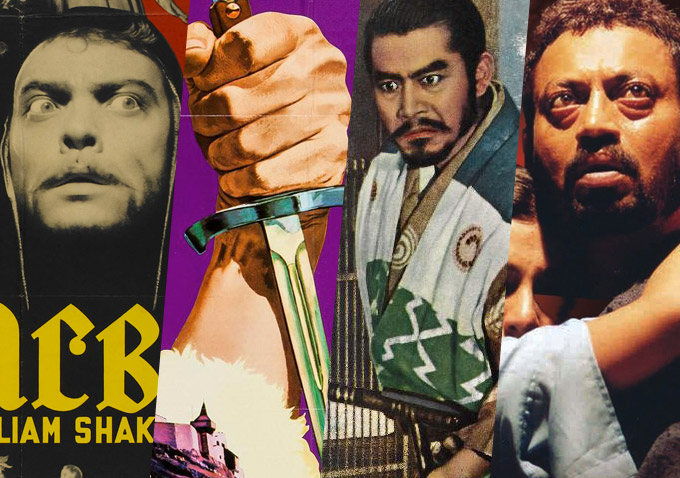“Men of Respect” (1990)
Honestly, “Macbeth” can pretty much be transposed onto any context in which killing isn’t seen as too out of the ordinary. Turbulent wartorn Japan made sense in “Throne Of Blood,” and so does the high-stakes world of organized crime. Geoffrey Wright recognized the parallels between power-hungry gangsters and scheming Scots when he moved the action to gangland Australia for his 2006 adaptation, but William Reilly executed this same concept better and earlier with 1990’s “Men of Respect” (though Reilly wasn’t quite the first one to imagine Macbeth as a wiseguy; that’d be Ken Hughes in 1955 with the lumpy “Joe Macbeth”). The concept doesn’t move far beyond its central mashup conceit, and seeing made men maintain a straight face while intoning thee’s and thou’s can sometimes make for an awkward sight, not to mention the hopeless pseudo-cleverness of naming the Banquo avatar Bankie Como. But there are distinct pleasures to be had in a white-hot performance from John Turturro in his prime, swaggering around with Italian-American braggadocio. He captures the volatility of the character as hungry mobster Mike Battaglia, gobbling up all of the crumbs of authority that fall his way, until he stumbles into a feeding frenzy and binge-eats until he keels over.
 “Scotland, PA” (2001)
“Scotland, PA” (2001)
Perhaps the most boldly divergent of the many “Macbeth” reworks, William Morrissette’s “Scotland, PA” doesn’t stop at relocating Shakespeare’s hotbed of Machiavellian scheming into a fast-food joint. The film completely overhauls the tone of the play, transmuting the tragic elements into absurd black comedy. Both the original text and Morrissette’s film use Macbeth’s follies as a tragic teaching aid, but while Shakespeare led audiences to therapeutic catharsis in the concluding bloodbath, “Scotland, PA” sniggers at the pathetic maneuvering of the dimwits onscreen and invites us to share in the laugh. The year is 1975 and Joe McBeth is a wage slave at a Mickey D’s knockoff, harboring dreams of manager status and converting the restaurant to a high-efficiency drive-through. A prophecy handed down to him by a trio of soothsaying stoners gets him hooked on the notion of supremacy, and all it takes is a few nudges from his girlfriend before the manager is duct-taped in the walk-in fridge. Vaguely reminiscent of the Coen Brothers’ wretches in “Fargo” via their amateur-hour criminal ineptitude, the denizens of “Scotland, PA” are objects of ridicule, schemers to whom fate appears as a mean joke rather than divine force.
“Maqbool” (2003)
Vishal Bhardwaj slunk into the Mumbai underworld to make a proper Shakespearean adaptation for the people of India. None of the liberties that Bhardwaj took with the story —turning the Lady Macbeth figure into the Duncan figure’s wife and Macbeth’s mistress, as well as promoting the crooked-cop Weird Sisters from prophets to active forces on the goings-on in the plot— directly result from Indian cultural mores. Instead, the film fine-tunes the play’s dramatic arc for maximum emotional affect. As in his “Othello” adaptation “Omkara,” Bhardwaj conjures sweeping Bollywood sentiment from the longing and anguish that drive Macbeth to murder. Indian cinema has a rich history of jazzy gangster flicks, and hearing everyone refer to Maqbool as “don” certainly calls Hindi crime classic “Don” to mind, but the overarching mood is one of classicism and refinement. And unlike his subject, Bhardwaj’s ambition paid rich dividends. “Maqbool” put him on the map, leading to slots at Cannes and Toronto along with the professional esteem of Francis Ford Coppola. Both Bhardwaj and leading man Irrfan Khan were destined for success, though the filmmaker remained in India while Khan moved on to major roles in Hollywood films. “Maqbool” sees both enacting a strong, assured view on Shakespeare that manages to feel both fresh and respectful of tradition.






"Men of Respect" fails for this viewer in making Macbeth a criminal from the beginning; one of the important aspects of the Macbeth story is that our hero is a good man who falls from grace. Without that essential goodness, there is no contrast to the monster he becomes, and no reason for the guilty conscience that tears him apart, and, ultimately, no tragedy. In its place on this list I would recommend the "ShakespeaRe-Told" version of Macbeth starring James McAvoy, which is a much more imaginative (and, IMO, successful) rethink of the play with a modern setting. And "Scotland, PA" fails for this viewer because it is a crappy movie through and through. The plotting is never organic, feeling like events are being imposed by the structure of the play rather than coming organically from character motivations, it wastes time with pointless digressions (Mac ostensibly goes hunting in "Birnam Wood" with Banquo so he can kill him, but instead nothing happens?), it misunderstands the source material (the point of Lady Macbeth\’s hallucinations are not her hands, but the metaphorical & literla blood on them — Scotland PA retains the hand fixation but does away with the blood!) and the jokes aren\’t funny. Suggest replacing it with the Patrick Stewart "Macbeth."
Richard, that\’s because O was based on Othello and not Macbeth.
No mention of "O". I\’ll admit it wasn\’t a masterpiece, but it was interesting and for the most part well acted.